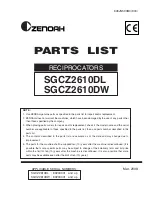
10
REMOVING THE BLADE – Turn the handle (A) Fig. 2 clockwise to release tension
on the saw blade. Remove the blade, first from the pulleys, and then from the
blade guide.
Before installing a blade, clean any acumulated chips and wax from the blade
guides and pulley tires.
INSTALLING THE BLADE – Place the
blade in the blade guides and then on
the pulleys. Point the teeth on the left
side of the machine toward the rear
(Fig. 3).
Turn the handle (A) Fig. 2 counter-
clockwise as far as it will go to place
tension on the saw blade.
Start and stop saw two or three times
to seat the blade on the pulleys.
TO ADJUST THE BLADE TRACKING
This saw is equipped with an adjustable blade-tracking mechanism. When
properly adjusted, the back edge of the blade will run lightly against at least one
of the back-up rollers. To adjust:
1. Use a 9/16" wrench to loosen the locking nut (A) Fig. 4, by turning it counter-
clockwise, one or two turns.
2. Use a flat screwdriver to turn the tracking screw (B) Fig. 4, 1/4 turn. Turning the
screw clockwise will move the blade toward the blade guide rollers. Turning
the screw counter-clockwise will move the blade away from the blade guide
rollers.
3. Tighten the locking nut.
4. Start the saw, following the directions
in "TO START AND STOP THE SAW".
Observe the blade tracking.
5. Repeat Steps 1 through 5 as necessary
to achieve proper tracking.
HOW TO USE A PORTABLE BAND SAW
1. Firmly secure the workpiece to prevent
movement.
2. Set the variable speed switch. You can
change this speed while the machine is
running.
3. Hold the saw as shown in Fig. 5
with the work stop (A) contacting
the work, and with the blade
teeth clear of the workpiece.
4. Start the saw and lower the
blade on the workpiece. Allow
the weight of the saw to control
the cutting pressure. Additional
pressure will reduce cutting
efficiency.
5. Hold the saw straight in the cut. Twisting or cocking of the blade results in
shorter blade life.
Disconnect the tool from the power source!
Fig. 2
A
Fig. 5
B
Fig. 4
B
A
POSITION OF TEETH ON
LEFT SIDE OF MACHINE
DIRECTION OF BLADE TRAVEL
ON LEFT SIDE OF MACHINE
Fig. 3











































